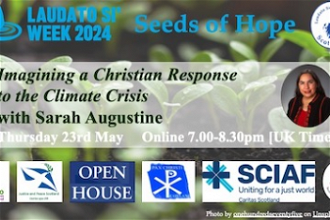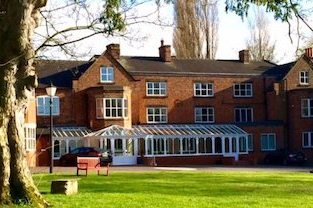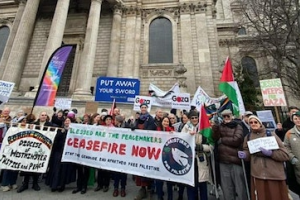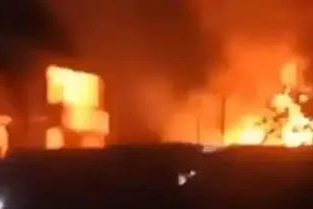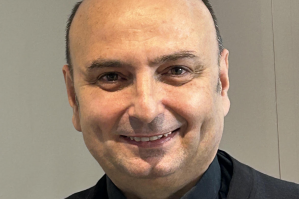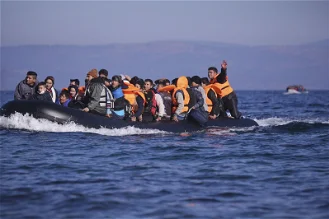J&P activists called to build peace internationally and locally
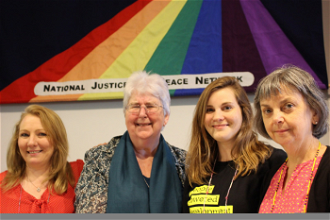
Women speakers at the conference with Pat Gaffney
A leading academic called for drastic action over the next 15 years to address climate change or face the consequences. Addressing the annual conference of the National Justice and Peace Network in Swanwick, Derbyshire, the Professor of Peace Studies at Bradford University, Paul Rogers, claimed that governments often adopt a military solution to try to control problems rather than dealing with underlying causes.
Professor Rogers declared that there was something very wrong with a world economy where the mass of wealth is accruing to a smaller and smaller number of people. "The neo-liberal economic system is not delivering justice," said the peace professor, who highlighted how this division of wealth was being exacerbated by some of the effects of climate change. "There is a neo-liberal economic system that finds it difficult to deal with the climate change," said Professor Rogers, who pointed out that the speed of destruction is getting worse with, for example, Typhoon Haiyan, which hit the Philippines in December 2013, running at speeds of 160 mph for 10 minutes. Some 6,300 people died as a result of the typhoon with untold damage done to the country.
The professor believes though that it is big shocks that often cause world governments to act. He quoted the example of how the London smog in 1952 killed 4,000 people in four days and "effected the power elites and brought the clean air act forward a decade," said Professor Rogers. Similarly the threat posed by chlorofluorocarbons (CFCs) in the 1980s brought quick action from governments to halt the danger. He claimed that there are things going on, almost unnoticed, to address current problems such as grid Photovoltaic panels being erected across sub Saharan Africa.
Professor Rogers believes the next 15 years will be crucial in moving strongly to address the threats posed by climate change to peace and the environment. "The period between now and 2030 is crucial - we have to work to get the changes," said Professor Rogers, who remains positive that this will be achieved. "We can have a peaceful, sustainable and just world in the 2070s if we make the right moves now up to 2045," he added.
Priest and Goldman environmental prize winner (2012) Fr Edu Gariguez told of the threat posed to the Philippine people and environment by large mining companies. He recalled how there are 92 large scale mining applications for the island of Mindoro, where he lives. The Philippines government see mining as a way to develop the country. "The neo liberal system sees natural resources as something to be exploited rather than something for the sustainable life of all," said Fr Gariguez, who has been targeted by death squads for his activities campaigning against exploitative mining practices. "If we are pro-life, we must be pro-environment," said Fr Gariguez, who, picking up on themes is the papal encyclical Laudato Si, called for "concerted collaborative action, working together in building our common home".
In a session, 'Making peace in the community: three women's perspectives', the mother of a 14 year old boy murdered on the streets of north London revealed how the only way she could move on was to forgive her son's killer. Lorraine Dinnegan, whose son Martin was stabbed to death in 2007, revealed how she felt if she did not forgive, "I'd just be left with misery and depression; I needed to just remember the nice and good things about Martin." Ms Dinnegan told how her parish church of St Mellitus in Finsbury Park and the local police had helped her through "this terrible time". She recalled sitting in the Old Bailey a year later watching the trial of Joseph Chin, 16, who murdered her son. He killed Martin because he looked at him the wrong way.
One positive development has been the rolling out of a Citizens Safe Havens scheme in north London. The Dinnegans learned about this scheme from the Mizens, who also lost their son Jimmy in similarly tragic circumstances in south London. "They'd set up a safe havens scheme, whereby those willing to help, like shops, put up a sticker in their window and then provided a safe haven," said Ms Dinnegan. St Mellitus Church, working with the police, managed to set up havens in 45 shops. "The police were grateful that people in the community were standing up for something good," said Ms Dinnegan, who has spoken in schools about knife crime and at six workshops with the police. Ms Dinnegan won the London Citizens "leader of the year award" in 2013.
Sister of the Congregation of the Holy Spirit, Maire Hayes, told of how faith groups are working together in Luton to bring harmony in the local community. Sr Maire is based in Luton, a town of 200,000 people that has been a focus of media attention over recent years. Sister Maire recalled the controversy when members of the Anglian regiment
marched through the town and there were protests about the soldiers' actions in Basra. The right wing English Defence League and, more recently, the group Britain First descended on the town, creating fear in the Muslim community. Sr Maire told how despite these type of incursions, Luton is a town where the people of different faiths pull together. She told of an annual peace walk and sporting events, when the different faiths come together. Also how the different faiths placed flowers in remembrance of the murdered soldier Lee Rigby. In another action, after a rabbi was harassed on his walk to his synagogue, members of the Muslim and Sikh communities walked with him to the synagogue for 18 months.
Sr Maire pointed out that despite the tensions, often stoked by people coming from outside, there was no trouble in Luton at the time of the riots across the country in 2011. "We strive to build community cohesion, working to empower Luton's faith and cultural communities," she said. Fiona Mwashita, a Progressio regional manager in Zimbabwe, told of work to empower women, making sure they know their rights and get the support they need.
The 37th NJPN conference titled The Things that make for Peace" was attended by 300 J&P activists from the country. At the conference Mass, Bishop John Rawsthorne, Emeritus Bishop of Hallam, said that "all of our peacemaking work is God's work".
Links:
Paul Rogers' weekly articles on 'Open Democracy' www.opendemocracy.net/author/paul-rogers



